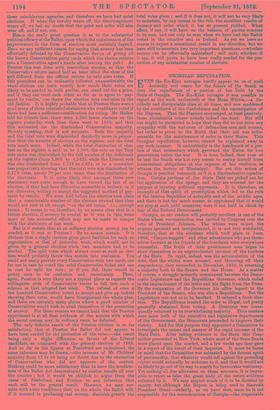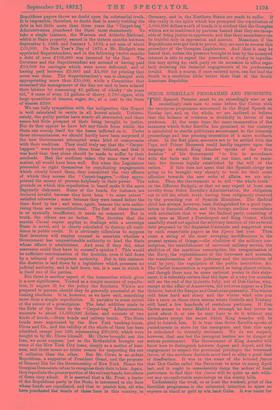GEORGIAN REPUDIATION.
EVEN the Ku-Klux outrages hardly appear to us of such decidedly evil omen for the future of the South as does the repudiation of a portion of her Debt by the State of Georgia. The Ku-Klux outrages it was possible to regard as the work exclusively of the Mean Whites,—a dis- orderly and disreputable class at all times, and now maddened by the overthrow of the Confederacy and the emancipation of the Negroes. That the Planters encouraged, at least passively, these abominable crimes nobody indeed can deny. But still one might be permitted to hope that they did so not from any sympathy with the torturers of defenceless men and women, but rather to prove to the North that their aid was indis- pensable for the maintenance of order in their States. This Georgian repudiation, however, cannot be explained away in any such manner. It undoubtedly is the handiwork of a por- tion of that aristocracy which governed the Union for two generations before the war. It is true, indeed, that even at its best the South was not very averse to easing herself from inconvenient obligations at the expense of her creditors, as witness the history of Mississippi. But yet this action of Georgia is peculiar, inasmuch as it is a discriminative repudia- tion. Certain portions of the State Debt are picked out for the application of the sponge, and they are selected for the purpose of injuring political opponents. It is, therefore, an example of that spirit of proscription which led to the ruin of the famous Republics of antiquity and of the middle ages, and there is but too much reason to apprehend that it would not atop at such mild measures, were it not held in check by fear of the Federal Government.
Georgia, as our readers will probably recollect, is one of the States whose reconstruction was carried by Congress over the veto of President Johnson. The whites were cowed, the negroes ignorant and inexperienced, it is not very wonderful, therefore, that at the elections which took place in June, 1868, "Carpet-baggers" and other adventurers who put them- selves forward as the friends of the freedmen were everywhere successful. The fruits of their government soon began to show themselves in an unprecedented increase of the burdens of the State. So rapid, indeed, was the accumulation of the debt, that the whites were aroused, and throwing off their despondency, they succeeded, in December, 1870, in returning a majority both to the Senate and the House. As a matter of course, a struggle instantly commenced between the Demo- cratic Legislature and the Republican Governor, which ended in the impeachment of the latter and his flight from the State. By the resignation of the Governor his office lapsed to the President of the Senate, who was also a Republican. But the Legislature was not so to be baulked. It ordered a fresh elec- tion. The Republicans treated the order as illegal, and pretty generally abstained from voting. A Democrat was conse- quently returned by an overwhelming majority. Thus masters once more both of the executive and legislative departments of the Government, the Democrats proceeded to improve their victory. And for this purpose they appointed a Committee to investigate the causes and manner of the rapid increase of the State Debt. After taking evidence in the State, this Com- mittee proceeded to New York, where most of the State Bonds were placed upon the market, and a few weeks ago they gave in a report of the result of their inquiries. It must be borne in mind that the Committee was animated by the fiercest spirit of partisanship, that whatever would tell against the preceding regime would naturally be welcome to it, and that it would not be likely to go out of its way to search for favourable testimony. Yet making all due allowance on these accounts, it is impos- sible to reject as false the great body of the sworn evidence collected by it. We may suspect much of it to be dictated by enmity, but although the Report is being used to discredit President Grant—unfairly, as we have seen, since he is not responsible for the reconstruction of Georgia—the respectable
Republican papers throw no doubt upon its substantial truth. It is impossible, therefore, to doubt that in nearly trebling the debt in but little more than three years the " Carpet-bag " Administration plundered the State most shamelessly. To take a single instance, the Western and Atlantic Railroad, which is State property, earned in the sixteen months between September 1, 1868, and January 1, 1870, a net sum of about £69,000. On New Year's Day of 1870, a Mr. Blodgett was appointed Superintendent, and in the following twelve months a debt of over £100,000 was incurred by the line. The Governor and the Superintendent are accused of having paid £10,000 for carriages which were never delivered, and of having paid between £3,000 and £4,000 for printing that never was done. The Superintendent's son is charged with appropriating more than £35,000, while a Committee that examined the management of the line are said to have solaced their labours by consuming 45 gallons of whisky " six years old," 8 cases of wine, 12 gallons of sherry, 6,700 cigars, with large quantities of lemons, sugar, &c., at cost to the State of almost £330.
We can fully sympathise with the indignation this Report is well calculated to excite in all honest minds. Unfortu- nately, the guilty parties have nearly all absconded, and there seems but little prospect of their being brought to justice. Nor do they appear to have left any funds from which the State can recoup itself for the losses inflicted on it. Under those circumstances, we should hardly have been surprised if the new Government attempted some kind of compromise with their creditors. They could truly say that the " Carpet- baggers " were forced upon them from without, and that it was hard that they alone should be made to suffer by their misdeeds. Had the creditors taken the same view of the matter, all would have been well. But when the Legislature proceeded to right themselves by repudiating engagements which clearly bound them, they committed the very offence of which they accuse the " Carpet-baggers,"—they appro- priated the money of persona helplessly in their power. The grounds on which this repudiation is based make it the more flagrantly dishonest. Some of the bonds, for instance, are declared invalid because they have been " to some extent " satisfied otherwise ; some because they were issued before the time fixed by law ; and some, again, because the acts autho- rising them are unconstitutional. The first of these reasons is so cynically insufficient, it needs no comment. But in truth, the others are no better. The doctrine that the maxim Caveat emptor applies to dealings with a sovereign State is novel, and is clearly calculated to destroy all confi- dence in public credit. It is obviously ridiculous to suppose that investors will employ counsel to ascertain whether a Government has unquestionable authority to bind the State whose affairs it administers. And even if they did, what assurance could they have in counsel's opinion ? This would be sufficient condemnation of the doctrine, even if laid down by a tribunal of competent authority. But in this instance the doctrine is laid down by a legislature which possesses no judicial authority, and is laid down, too, in a case in which it is itself one of the parties.
But there is another aspect of the transaction which gives it a new significance. Viewed as a simple measure of repudia- tion, it augurs ill for the policy the Southern Whites are prepared to pursue, should they be generally successful at the coming elections. It is, however, as we have said, something more than a simple repudiation. It partakes to some extent of the nature of a proscription. The total addition made to the Debt of the State by the " Carpet-bag " Administration amounts to about 11,000,000 dollars, and consists of two kinds of bonds,—State bonds and railway bonds. The State bonds were negotiated by the New York banking-house, Clews and Co., and the validity of the whole of them has been admitted, except just 100, representing £20,000, which were bought in by Mr. Clews himself. Mr. Clews brought out the loan, we must suppose, just as the Rothschilds brought out some of the New York City loans, simply as a matter of busi- ness, and there seems no better reason for suspecting the one of collusion than the other. But Mr. Clews is an ardent Republican, a supporter of President Grant, and the proposer of General Dix for the Governorship of New York. Hence the Georgian Democrats refuse to recognise their debt to him. Again, they repudiate the greater portion of the railway bonds, but others of them they admit. It is asserted that a Mr. Frost, a leader of the Republican party in the State, is interested in the lines whose bonds are repudiated, and that to punish him, all who have purchased the bonds of these lines in this country, in Germany, and in the Northern States are made to suffer. If this really is the spirit which has prompted the repudiation of 5,000,000 dollars worth of bonds, it is evident that the Georgian whites are so maddened by partisan hatred that they are incap- able of doing justice to opponents, and that their ascendancy can be fruitful only in oppression and misrule. Meantime, if the Republicans ever get back to power, they are sure to reverse this procedure of the Georgian Legislature. And thus it may be feared that, unless the pressure brought to bear by the moneyed interest is able to repeal the precedent, a rivalry in repudia- tion may spring up, each party on its accession to office regu- larly declaring the financial engagements of its predecessor invalid. Such a course, if once entered upon, can but lead the South to a condition little better than that of the South American Republics.



































 Previous page
Previous page